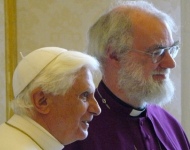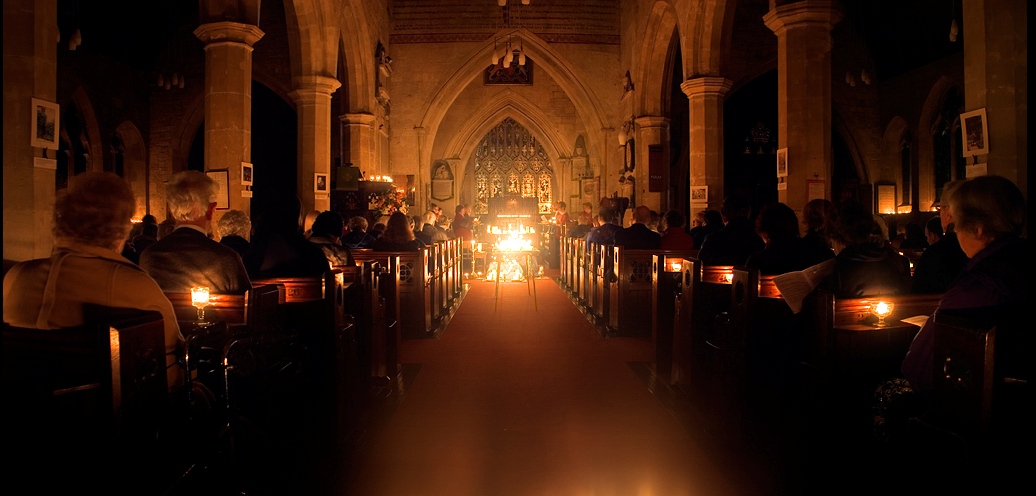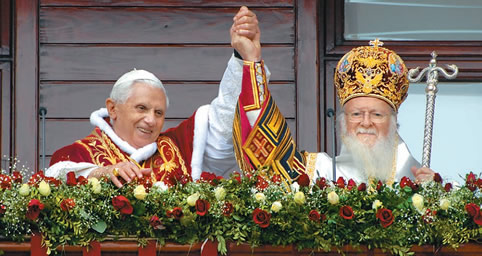The Ecumenical Apologist
 As I wrote in my very first post, recently I have been called upon more and more to defend my faith – Christianity in general and Catholicism in particular.
As I wrote in my very first post, recently I have been called upon more and more to defend my faith – Christianity in general and Catholicism in particular.
The continued questioning by others about my faith was actually one of the main reasons I started this blog in the first place. Sometimes, in an attempt to provide someone with a satisfactory explanation, I had to do quite a bit of research. A blog will now allow me to share the fruits of my hard work with more than just that one person! Also, as time has progressed I’ve noticed that much of the discussion has been around similar issues so I intend to use this blog to publish my explanations to some of the more commonly-asked questions and invite feedback.
However, before I can start addressing some of these issues, I feel the need to write about a tension that I find within myself, the tension that comes from being an “Ecumenical Apologist”…
Ecumenical?
Both “ecumenical” and “apologist” are terms with which some people may be unfamiliar. The word “ecumenical” derives from the Greek word “oikoumene” (οἰκουμένη), which literally means “that which pertains to the whole inhabited world” and its use is even found in Sacred Scripture:
“And this gospel of the kingdom will be preached in the whole world as a testimony to all nations” – Matthew 24:14
This word “ecumenical” is sometimes used to describe Church councils, a coming together of bishops from the whole Church to address matters of belief and practice. The term is also used in reference to Christian Unity and it is this meaning on which I would like to focus today.
Horrible Histories & Family Squabbles
Over the Church’s 2,000 year history there have unfortunately been many ruptures. Through schism and disagreement over doctrine, various groups of Christians have identified themselves as being apart from other groups of Christians and have formed separate denominations.
The first main rupture in the church was the Great Schism in the 11th Century which separated Eastern (Greek) Christianity and Western (Latin) Christianity. The second major rupture was the Protestant Reformation of the 16th Century and resulted in further rapid fragmentation.
The Ecumenical Mission
How many denominations are there? The answer is subjective and depends upon how exactly one defines “denomination”, but the answer ranges from several hundred to thousands. In some respects, the exact number is of little consequence since even two denominations is one denomination too many.
The mission of Ecumenism is to reconcile Christians of different denominations with each other so that the entire Christian Church may present a united witness to the world. This goal takes as its inspiration the prayer of Jesus on the eve of his Passion:
“Holy Father, protect them by the power of your name—the name you gave me—so that they may be one as we are one…I pray also for those who will believe in me through their message, that all of them may be one, Father, just as you are in me and I am in you. May they also be in us so that the world may believe that you have sent me.” – John 17:11,20-21
One group for whom ecumenism is incredibly important is found in Taizé, France. The Taizé community is an ecumenical monastic order composed of monks from over thirty countries and of many different Christian denominations. It attracts over the course of a year approximately 100,000 visiting young adults of every Christian stripe from across the world for a week’s retreat.
Now it’s personal…
The seeds of my own desire for Christian Unity were sown in 2001 when I spent a week at Taizé, but by 2003, a real fire was in my belly. It seemed that almost every time I opened the Scriptures I would see again and again how Christ’s Church had to be one, divisions being not acceptable. Jesus prayed for the oneness of His Church, St. Paul wrote about its beauty in his epistles and the Acts of the Apostles lived it out.
Yet when I looked around I didn’t see much brotherly love between many Christian groups. It seemed crazy to me how efforts and resources were needlessly duplicated across the various churches, all of whom shared the common mission of drawing people closer to Christ.
In an attempt to help remedy the situation, I began, together with my girlfriend, to organize evenings of “Taizé-style” prayer during the Week Of Prayer for Christian Unity. All the members of all the churches in the area were invited and the purpose was simple: to pray for the unity of the Church.
It was something of an eye-opener to see the different ways in which the different churches reacted to the idea of coming together to pray for the Church. I received many rather disinterested responses and some that were actually quite toxic. However, others were incredibly enthusiastic. The sense of community at those evenings was wonderful, with the choir, the ushers and everyone else, who helped make the evening possible, drawn from the many different churches in the town.
Some good fruit and some great friendships came out of those evenings and it was certainly the most character-forming of any ministry with which I’ve been involved. The evenings ran for several years and will continue in my absence.
Apologist?
The word “apologetics” comes from the Greek word “apologia” (απολογία) which means “speaking in defence”. An apologist, therefore, is not someone who apologizes for something, but someone who offers a reasoned defence.
I have recently had to offer a defence of my faith when questioned by atheists, agnostics, Muslims, Mormons and by various different Protestant groups. Only last month I had to defend the authorship of the New Testament and the right of unborn babies to life whilst at the barber’s, which is why my haircut currently looks a little strange…
Tension?
So what is the source of tension in being an “Ecumenical Apologist”?
Well, it lies in the balancing act of both recognizing commonality and affirming the truth a person already has but still correcting what is wrong and leading them into greater truth. This is a far from simple task. Exactly how one would go about this would depend upon whether one was speaking with a Jew, a Muslim, a Buddhist etc. I’m intending to write about my interactions with some of these groups another time, but today I would like concentrate on non-Catholic Christians.
“What unites Christians is infinitely greater than what divides us” – Raniero Cantalamessa, Preacher to the Papal Household
I have already outlined my great passion for Christian Unity, but I must also add that I am definitely, decidedly a Roman Catholic. As such, I hold certain beliefs which are not compatible with many of the founding principles of Protestantism.
Many of my friends are Christians who don’t belong to the Catholic Church. I would actually go so far as to say that the majority of my closest friendships are with non-Catholic Christians. Many of these relationships came about through various ecumenical projects and also during my anti-Catholic years when I was Protestant in all but name. This subject is therefore very close to my heart, sensitive and exceedingly close-to-home.
But is it actually possible to be an “Ecumenical Apologist”? Isn’t it an oxymoron? I would say that it is possible, even if it’s a tricky and sometimes a very painful path to walk.
Open to the Spirit
I find that I must constantly remind myself that the conversion of hearts is not done by any human being, but brought about by the work of the Holy Spirit. Unless I remain open to the Spirit there is no hope whatsoever of my being used to glorify God.
Maybe this is one of the reasons that ecumenism is often easier among charismatics of different denominations – the clear perception of the common indwelling of the Spirit providing a clear foundation on which to build relationships:
“Be completely humble and gentle; be patient, bearing with one another in love. Make every effort to keep the unity of the Spirit through the bond of peace. There is one body and one Spirit—just as you were called to one hope when you were called— one Lord, one faith, one baptism; one God and Father of all, who is over all and through all and in all.” – Ephesians 4:2-6
Truth & Love
However, in an attempt to provide a more complete answer I would like to look at the “locus classicus” for scriptural apologetics. This is the typical passage cited from the Bible about apologetics:
“But in your hearts set apart Christ as Lord. Always be prepared to give an answer to everyone who asks you to give the reason for the hope that you have. But do this with gentleness and respect” – 1 Peter 3:15
St. Peter says that we must always be ready to give an answer and to give it lovingly. I think that the success or failure of being an “Ecumenical Apologist” is in balancing the two parts of this exhortation:
1. Truth (“Always be prepared to give an answer…”)
2. Love (“…do this with gentleness and respect”)
I can certainly attest to many times when I’ve got this balance wrong. There have been times when I have been so focused on presenting the truth that I’ve bulldozed the other person, belittling them as well as their opinions. I had, as Bishop Fulton Sheen once said, “won the argument but lost the soul”. Without love I had become, as St. Paul would say, “a clashing cymbal” (1 Cor 13:1).
Conversely, there have been many times when I have been so focused on loving the other person and being really gentle that I have compromised too much and held my tongue when I should have spoken. In choosing to love the friendship over the friend, I failed in my duty to be salt and light (Matthew 5:13). Sometimes holding my tongue might be the right and wise course of action, but I’m afraid to say that, more often than not, I have held my tongue out of fear of what the truth might do…
Conclusion
It seems to me that as soon as we reach either extreme we have failed, either watering down the truth (a constant danger in ecumenism) or seeing the other person as an enemy to be humiliated and crushed.
If I truly want to be this “Ecumenical Apologist” then I must always be open to the Spirit and always, always, always speak truth in love.
“Christians cannot underestimate the burden of long-standing misgivings inherited from the past, and of mutual misunderstandings and prejudices. Complacency, indifference and insufficient knowledge of one another often make this situation worse.
Consequently, the commitment to ecumenism must be based upon the conversion of hearts and upon prayer, which will also lead to the necessary purification of past memories.
With the grace of the Holy Spirit, the Lord’s disciples, inspired by love, by the power of the truth and by a sincere desire for mutual forgiveness and reconciliation, are called to re-examine together their painful past and the hurt which that past regrettably continues to provoke even today”– Pope John Paul II, Ut unum sint


